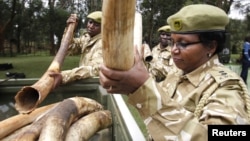Trafficking in wildlife and wildlife products is among the world`s most lucrative illicit markets, worth between 7 and 10 billion dollars per year. “This year alone, 30,000 African elephants will be killed for their ivory,” wrote Under Secretary of State for Economic Growth, energy, and the Environment Robert Hormats in a recent article. “Rhino poaching has extirpated [completely destroyed] two African subspecies over the last decade.”
The fact that wildlife is being decimated at a horrendous rate is bad enough, but that’s not the end of the damage. Speaking at a recent partnership meeting on wildlife trafficking, Secretary of State Hillary Clinton said that “wildlife trafficking has serious implications for the security and prosperity of people around the world:”
“Local populations that depend on wildlife, either for tourism or sustenance, are finding it harder and harder to maintain their livelihoods. Diseases are spreading to new corners of the globe through wildlife that is not properly inspected at border crossings. Park rangers are being killed. And we have good reason to believe that rebel militias are players in a worldwide ivory market worth millions and millions of dollars a year.”
The United States is calling on its partner countries to join it in helping to protect the world’s natural wonders by developing a global approach on how to deal with this problem; by publicizing the problem and calling on the public to avoid buying products made from protected species; and by strengthening and expanding law enforcement efforts. The United States is also calling on its partners to join the Coalition Against Wildlife Trafficking, whose goal is to end the illegal trade in wildlife.
“The world’s wildlife, both on land and in our waters, is such a precious resource, but it is also a limited one. It cannot be manufactured. And once it’s gone, it cannot be replenished,” said Secretary Clinton. “Those who profit from it illegally are not just undermining our borders and our economies. They are truly stealing from the next generation. So we have to work together to stop them and ensure a sustainable future for our wildlife, the people who live with them, and the people who appreciate them everywhere.”
The fact that wildlife is being decimated at a horrendous rate is bad enough, but that’s not the end of the damage. Speaking at a recent partnership meeting on wildlife trafficking, Secretary of State Hillary Clinton said that “wildlife trafficking has serious implications for the security and prosperity of people around the world:”
“Local populations that depend on wildlife, either for tourism or sustenance, are finding it harder and harder to maintain their livelihoods. Diseases are spreading to new corners of the globe through wildlife that is not properly inspected at border crossings. Park rangers are being killed. And we have good reason to believe that rebel militias are players in a worldwide ivory market worth millions and millions of dollars a year.”
The United States is calling on its partner countries to join it in helping to protect the world’s natural wonders by developing a global approach on how to deal with this problem; by publicizing the problem and calling on the public to avoid buying products made from protected species; and by strengthening and expanding law enforcement efforts. The United States is also calling on its partners to join the Coalition Against Wildlife Trafficking, whose goal is to end the illegal trade in wildlife.
“The world’s wildlife, both on land and in our waters, is such a precious resource, but it is also a limited one. It cannot be manufactured. And once it’s gone, it cannot be replenished,” said Secretary Clinton. “Those who profit from it illegally are not just undermining our borders and our economies. They are truly stealing from the next generation. So we have to work together to stop them and ensure a sustainable future for our wildlife, the people who live with them, and the people who appreciate them everywhere.”






